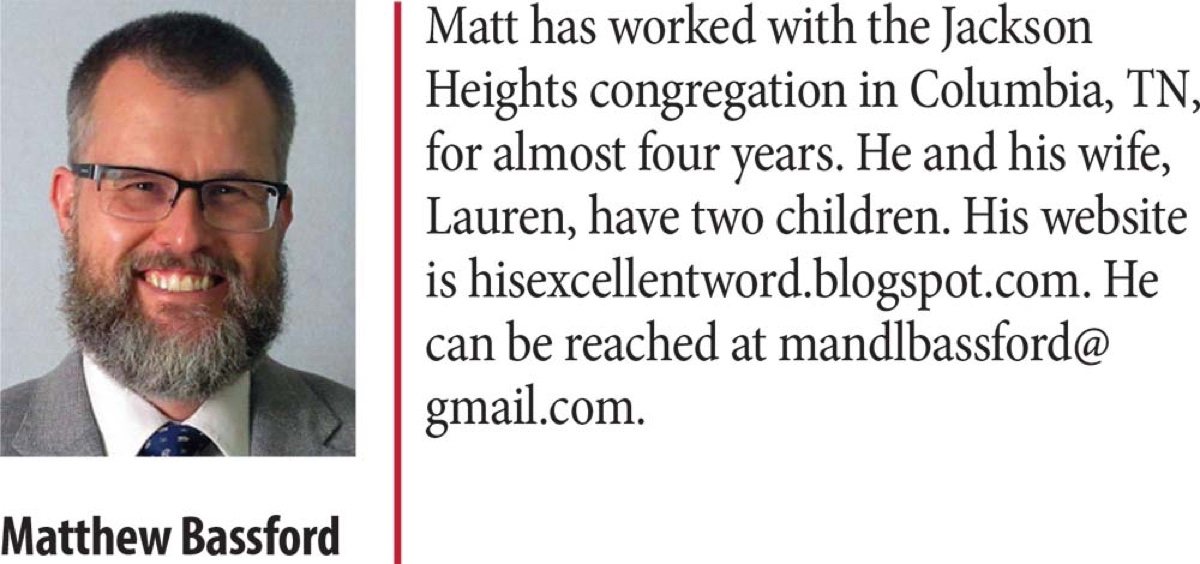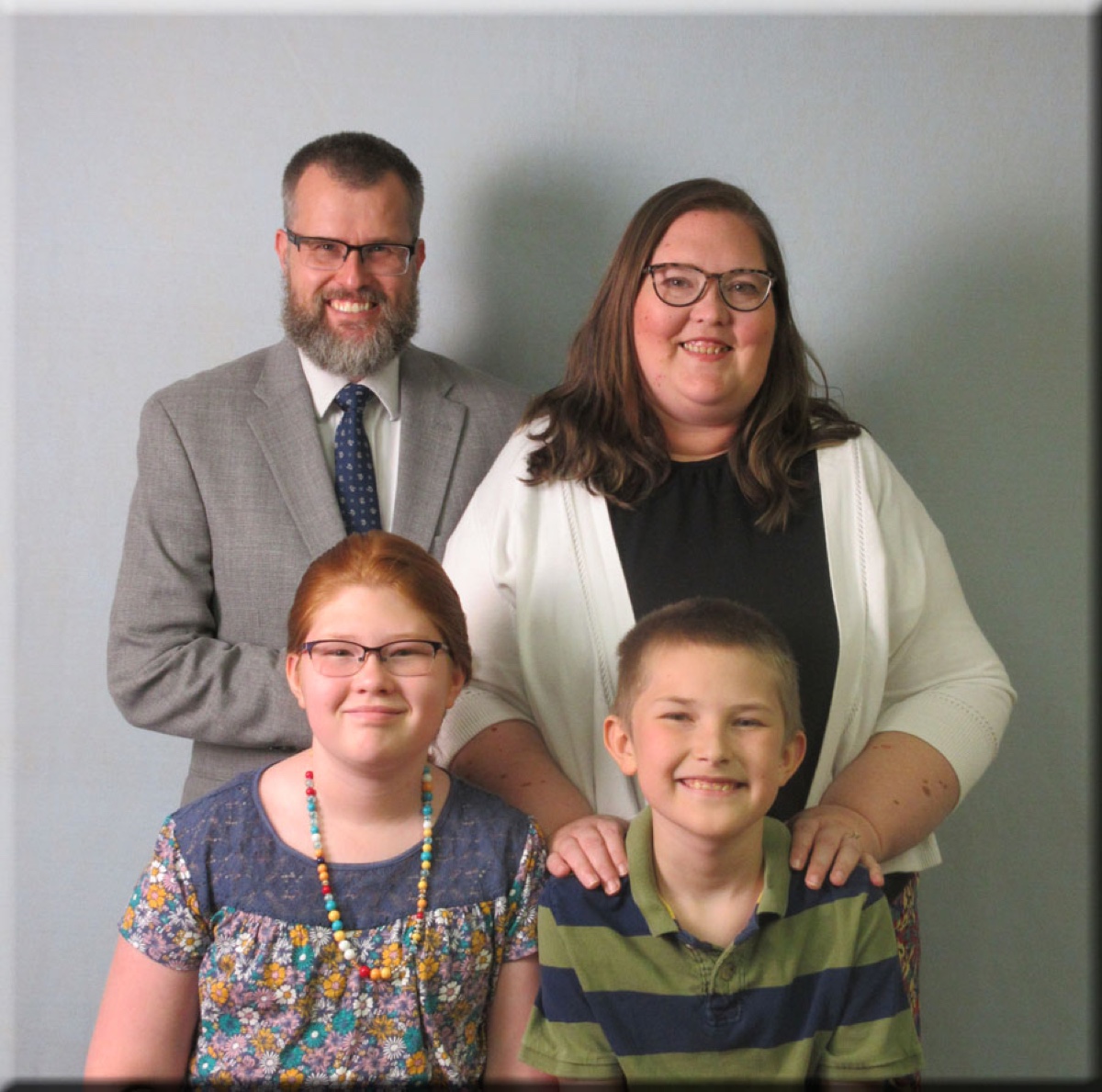by Matthew Bassford
Synopsis: When confronted with doubt and despair, may we recall the faith of Jeremiah, the weeping prophet: "O LORD, my strength and my stronghold, and my refuge in the day of distress. . ." (Jer. 16:19).
Amyotrophic lateral sclerosis, or ALS, is a degenerative motor-neuron disease. As the disease progresses, motor neurons throughout the body die, causing the victim to lose control of his limbs, the muscles involved in speech and swallowing, and finally the diaphragm, leading to suffocation and death. Most people with ALS die within five years of their diagnosis.
ALS is also known as Lou Gehrig’s disease, named after the baseball great. Gehrig’s decline, from world-class athlete to death, took about three years. Even today, there is no FDA-approved treatment that can cure the disease or even slow its progression by more than a few months.
In July 2021, I was diagnosed with ALS.
In some ways, this was not a shock. Ninety percent of ALS cases are what is called sporadic ALS, in which the disease arises for whatever reason in someone who has no family history of it. I’m in the other 10 percent. I have a family history of ALS; both my mother and her brother, my uncle, died from the disease. Because of the way that ALS is inherited, I’ve known for years that I had a 50-50 chance of developing it myself.
The timing, however, was shocking. My mother was over seventy when she passed. My uncle was in his sixties. I, in contrast, am forty-two. Worse yet, I have an eleven-year-old daughter and a nine-year-old son.
Consequently, I invested a lot of mental effort in trying to explain away my symptoms. The stiffness and weakness in my legs was nothing more than the result of middle age. I was falling because I wasn’t paying attention to where I was walking. Probably my new bifocals had something to do with it, too. The weakness in my right hand was carpal-tunnel syndrome. I was wearing my watch too loosely, or too tightly, or something. Any explanation, no matter how contrived, was preferable to the obvious and unthinkable.
However, as I made my way through a series of tests that eliminated the other possibilities (no Lyme disease, no manganese poisoning, no vitamin B6 deficiency, etc.), I had to start thinking about the unthinkable. During the day, I comforted myself with alternative explanations (“Parkinson’s! I have young-onset Parkinson’s!”), but I think my subconscious knew the truth, and it ruled my nights.
Every night, I began waking up at about 2:30 in the morning, filled with panic and terror. It took me hours to calm down enough to go back to sleep, and sleep deprivation quickly took its toll on my mental state during the day. I felt good for an hour or two after working out, but I spent the rest of my waking hours in an increasingly dark haze of misery.
The tipping point for me came one Monday after an existentially awful morning of work at the church building. As I prepared to make the left turn out of the Jackson Heights parking lot, I thought, “If I pulled out right in front of that dump truck in the left lane, I could kill myself.” After a moment’s thought, I revised my plan. A dump truck in the right lane would be better because then the impact would occur on the driver’s-side door, which would be more likely to be fatal.
When I realized what I was thinking, it shook me to my core. I don’t hold to the Catholic doctrine that all suicides automatically go to hell, but I still didn’t want to kill myself! I had dealt with other depressive episodes in the past on my own, but clearly I needed help with this one.
My wife and I spent the next day in the ER of the Vanderbilt Medical Center, in search of a consultation with both a neurologist (who seemed to be unavailable in middle Tennessee) and a psychiatrist. The latter prescribed a couple of antidepressants that had a powerful and immediate effect on me. I began sleeping through the night again, and with the added rest, I quickly recovered my mental footing during the day as well.
As a result, even though anxious uncertainty about my condition has turned to grim certainty, I feel much better now. I’ve also found that knowing the truth, no matter how bad the news might be, is better than not knowing and fearing the worst. My earthly future is bleak. I have no reason to expect that the inexorable march of ALS through my body will spare me any more than it spared my mother, an extraordinary woman of God though she was.
At this story, a skeptic might sneer. Where is God in all this? I’ve been a Bible-believing, churchgoing Christian all my adult life. I seek to love and serve others. Also, I have done my best to take care of my body; I don’t drink, smoke, or use drugs. I watch my weight and exercise daily.
In short, I have done all the things that are supposed to lead to divine favor and long earthly life. Yet, what has befallen me seems like a karmic judgment appropriate for the foulest reprobate. Who sinned, I or my parents, that I should be thus afflicted? In the absence of sin, doesn’t this look much more like the world of the atheist, in which the righteous and the wicked alike are subject to the whims of chance, than it does like the world of the believer, which is ruled by a merciful and omnipotent God? So, I ask again: Where is God in all of this?
First, God is present (and powerfully so) in His people. The Facebook post in which I shared my struggle with mental illness generated the most likes and shares I have ever seen from an unpaid post on Facebook. My announcement of my diagnosis was a close second.
We Christians are a communal lot, perhaps not as much as we should be by biblical standards, but certainly much more so than nearly anyone else in our splintered, solipsistic society. The unbeliever can go through life with hardly anyone caring much about them, but those who are devoted to the Lord will find that their fellow believers are also devoted to them.
No one will ever confuse me with Jeff Bezos when it comes to material wealth, but I have lived a life rich with love and Christian family. I would not trade my riches for his. Never has the value of this love been more obvious. I have received thousands of expressions of love and concern, from the members of my congregation, from old friends in other places, and from brethren on whom I’ve never laid eyes.
Similarly, thousands of disciples are praying for me. They range from some of the most prominent preachers in the brotherhood and the elders of many congregations to humble saints who would not so much as make a comment in Bible class but live lives of selfless service. Because of all those who are approaching the throne on my behalf, I feel that I have maximized the potential of prayer. Whatever it can accomplish in my case, it assuredly is accomplishing!
I believe that this already has been evident in the quality of medical care I have received. I’ve seen many doctors, nurses, and therapists. Uniformly, they have proven to be a tremendous blessing. Indeed, given the fact of my ALS, all of my various appointments have gone as well as they could, especially in the swift diagnosis of my disease. That has enabled me to begin treatment much earlier than normal, which may well pay dividends by giving me extra months of function. I am deeply thankful for this, and I hope that the prayers of others will continue!
Likewise, my reaction to the antidepressants I’ve been taking has been extraordinary. I’ve known many people who have received marginal or no benefit from such medications. I’ve never even heard of anyone experiencing as dramatic a change for the better as have I. Serendipitous brain chemistry? Maybe. An answer to prayer? Certainly!
I don’t know how providence and prayer will shape the rest of my life, but I am confident that it will do so powerfully. For instance, as any Christian in my position would be, I am concerned about the fate of my children. How will they fare without me to guide them? Nonetheless, I am comforted by the conviction that God will not allow their souls to be lost because of my illness. Maybe some new medical therapy allows me to live much longer than I otherwise would. That, too, would be a mighty sign of God’s mercy.
I also see God in the Bible’s rich theology of suffering. Modern Americans who prefer to believe that we can solve every difficulty through ingenuity and hard work often ignore this scriptural teaching. We hold in our hands the power to make ourselves happy. Of course, this Pollyanna worldview falls apart when it encounters (as it invariably does) problems that are beyond our power to solve.
The Bible falls into neither this error nor into the error of promising that the lives of the faithful will be prosperous and painless. Indeed, much of the Old Testament wisdom literature, particularly the books of Job, Psalms, and Ecclesiastes, is preoccupied with the problem of righteous suffering. Arguably, this preoccupation is even more pronounced in the New Testament. Jesus Himself was righteous, even sinless, yet He suffered to the point of death. All of His apostles, as different as they were in other ways, were united in their suffering for His sake.
In fact, early Christians would have scoffed at the notion that their faith should protect them from earthly harm. They knew full well that they were promised every spiritual blessing in the heavenly places, not every earthly one. Their faith might well expose them to suffering that they otherwise could have avoided.
The benefit of Christianity does not lie in protection from suffering. It lies in the uniqueness of suffering as a Christian. Although God does not promise protection from every evil, He guarantees us strength and grace to endure it. When we suffer as Christians, our suffering is meaningful. To paraphrase Jesus in John 9:3, it was neither I nor my parents who sinned, but that God’s works might be displayed in me—if I so choose.
For us, every trial is a choice, and the greater the trial, the greater the choice. I can crumple under the weight of hardship, or I can seek the Lord and glorify Him. Indeed, I believe God allows the faithful to suffer severely in order to make the latter choice possible. My diagnosis already has taught me things I would have learned in no other way, and when I share those things with others, I help them and honor Him.
I intend to do so for as long as I am able. Frontotemporal dementia, which was associated with my mother’s ALS, may show up to wreck me also. More people with ALS lose their ability to speak as the disease progresses, so my days in the pulpit are numbered.
However, modern assistive technology, which is pretty amazing these days, will allow me to “type” by tracking my eye movements even after I lose control of every other muscle. If my life and my mind remain with me, I will be able to serve and edify others. If I lose either, I hope that others will regard it as my final triumph and a final admission of defeat by Satan.
Naturally, this is not the only hope I cherish. Death and the devil can destroy my earthly body, as they will destroy everyone’s earthly body, until their work is halted by the Lord’s return. However, they cannot destroy my soul unless I let them. If I curse God and die, I will die indeed. If I remain faithful to Him, He will remain faithful to me and perform what He has promised. 3000 years from now, neither I nor anyone else who stayed true to Christ will have cause to regret that decision.
Nor is my hope convenient or unfounded. It rests on the resurrection of Jesus Christ, in whose likeness I too will rise. If Christ is not risen, I’m in a world of hurt, but it also is true that if Christ is not risen, no good explanation exists for the bizarre events surrounding the origin of Christianity. Even a skeptical reading of the first-century accounts yields sufficient proof for the resurrection, and I am comforted daily by this thought.
Additionally, if Christ is risen, He also is Lord and Savior. When I must give an account of the deeds done in the body, He will speak on my behalf. I need not justify myself because He will justify me. So often, I talk with Christians who worry about whether they have been “good enough” to inherit eternal life. I know that I’m not good enough, but I also know that Christ is.
Where is God in all this? God is everywhere in it. He is in the thousands of brothers and sisters who love me. He is in the powerful answers to their prayers. The truth about existence in this fallen world is preserved for me in His gospel of suffering and love. He assures me that even the greatest trials will allow me to live a meaningful life that glorifies Him. Finally, my hope of eternal life rests entirely in God the Father and His Son, Jesus Christ. I have every reason to rely on His word. Where is God in all this? In disaster, He is all that makes life worth living.


